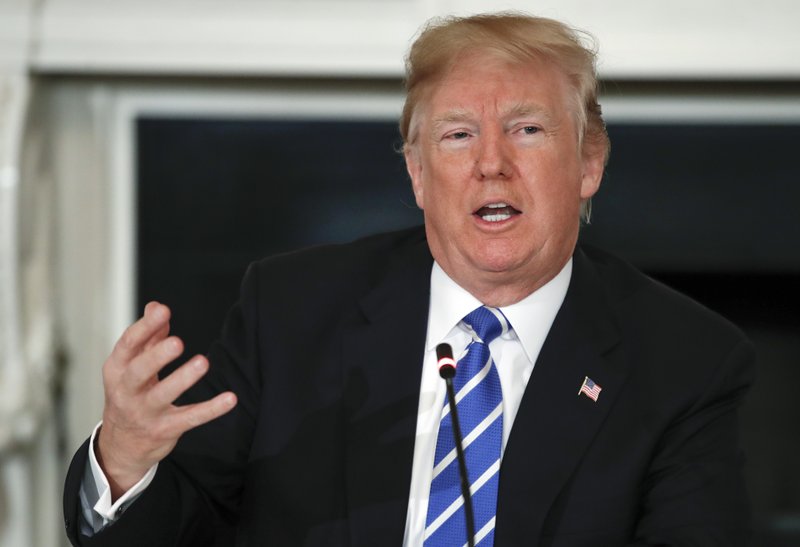WEST PALM BEACH, Fla. -- President Donald Trump in a series of tweets Sunday morning sought to shift the blame to Democrats for Russia's virtual war to meddle in the 2016 election, saying that President Barack Obama had not done enough to stop the interference.
Trump was responding to comments by Rep. Adam Schiff of California, the top Democrat on the House Intelligence Committee, that criticized Obama's muted response to the Russian threat.
"Obama was President, knew of the threat, and did nothing," Trump tweeted.
It was an apparent reference to a Friday interview in which Schiff said the Obama administration bears some responsibility "for not establishing a more forceful deterrent" to cyberattacks.
Trump also denied ever suggesting that Moscow might not have been involved.
[PRESIDENT TRUMP: Timeline, appointments, executive orders + guide to actions in first 200 days]
Trump, who has said little to publicly acknowledge a threat to U.S. democracy that one of his top aides called "incontrovertible" on Saturday, asserted that the efforts to investigate and combat the Russian meddling had only given the Russians what they wanted, saying that "they are laughing their [a**es] off in Moscow."
"If it was the GOAL of Russia to create discord, disruption and chaos within the U.S. then, with all of the Committee Hearings, Investigations and Party hatred, they have succeeded beyond their wildest dreams," Trump wrote.
On Saturday, the president's national security adviser, Lt. Gen. H.R. McMaster, said, referring to the Russian meddling, that "with the FBI indictment, the evidence is now really incontrovertible and available in the public domain."
In a late-night tweet Saturday, Trump said McMaster "forgot to say" at a security conference in Germany that the election results had not been changed as a result of the Russian interference. The nation's intelligence agencies believe that it is not possible to make such a conclusion.
According to three people with knowledge of his reaction, Trump began the weekend believing that something good had just happened to him after Robert Mueller, the special counsel leading an investigation into the Trump campaign's contacts with Russia, secured an indictment against several Russians.
But once ensconced at his Florida estate on Friday, Trump, facing long hours indoors as he avoided rounds of golf after Wednesday's school shooting a few miles away, began watching TV.
The president's mood began to darken as it became clearer to him that some commentators were portraying the indictment as nothing for him to celebrate, according to the three people.
The indictment says that while the Russians began their scheme in 2014 with the goal of undermining the U.S. democratic system, they eventually shifted their focus to trying to help elect Trump and disparage his opponent, Hillary Clinton.
As the weekend went on, Trump's long-standing frustrations with an inquiry that he has branded a "witch hunt" once again came to the fore. While Deputy Attorney General Rod Rosenstein had noted repeatedly in announcing the indictment that it does not say that Russia changed the outcome of the election, Trump was said to have been angry because his own team had not gone further in his defense.
That included McMaster. When he spoke in Germany, McMaster did not believe he could go further than the cold facts of the document, a reality that deeply frustrated the president, two administration officials said.
SHIFTING VIEWS
The president has repeatedly seized on the fact that the efforts started before he became a candidate, but he has glossed over the conclusion that they evolved to support his candidacy. The indictment does not assert any wrongdoing by the president or anyone affiliated with him.
In another tweet Sunday, Trump, who has since the campaign expressed doubts about who was behind the election intrusions, said that he had "never said Russia did not meddle in the election," making reference to a comment he made in a 2016 presidential debate.
"I said 'it may be Russia, or China or another country or group, or it may be a 400 pound genius sitting in bed and playing with his computer,'" Trump wrote. "The Russian 'hoax' was that the Trump campaign colluded with Russia -- it never did!"
Mostly, he has equivocated on the question of Russian interference, speaking at times as if he believes it happened and other times as if he does not. He's been consistent only in denying that his team colluded with Russia.
In November, he seemed to suggest that he believed President Vladimir Putin's denials of interference over the conclusions of U.S. intelligence agencies.
"Every time he sees me he says, 'I didn't do that,' and I really believe that when he tells me that, he means it," Trump said at the time, calling questions about Moscow's meddling a politically motivated "hit job."
He said the next day that, while he thought Putin was sincere, he believed U.S. intelligence agencies' assessments that Russia had meddled.
On Sunday, Trump praised the remarks by Schiff, one of his chief antagonists, about Obama's response to Russian meddling. But at the same time, Trump called the congressman "the leakin' monster of no control."
"Now that Adam Schiff is starting to blame President Obama for Russian meddling in the election, he is probably doing so as yet another excuse that the Democrats, lead by their fearless leader, Crooked Hillary Clinton, lost the 2016 election," Trump wrote.
The president in the past has traded bitter Twitter messages with Schiff, accusing him of leaking classified information. Schiff shot back at Trump on Sunday, saying on Twitter that "if McMaster can stand up to Putin, why can't you?"
Information for this article was contributed by Katie Rogers and Maggie Haberman of The New York Times; by Catherine Lucey, Jonathan Lemire and Calvin Woodward of The Associated Press; and by Shannon Pettypiece and Mark Niquette of Bloomberg News.
A Section on 02/19/2018
